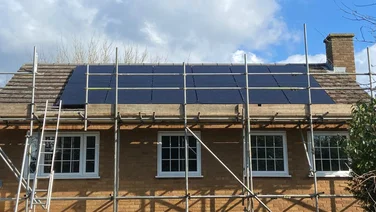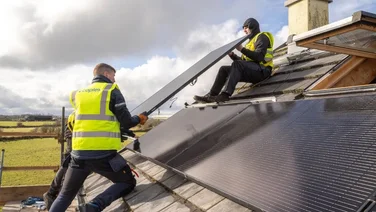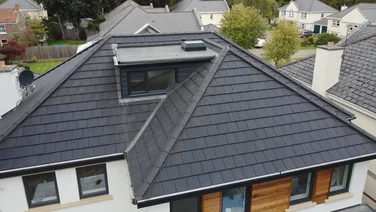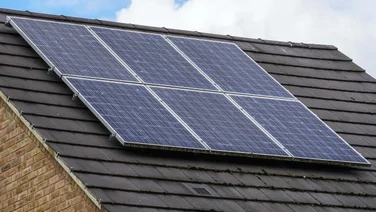✔ Toyota, Hyundai, and Mercedes-Benz have designed cars with solar roofs
✔ Cars with solar panels could cost anywhere from £40,000 to £200,000
✔ EVs with solar panels could make up 10% of the market by 2030
It can be expensive to charge an electric vehicle (EV), and EV home chargers cost a lot of money too.
So why not charge on the go by putting solar panels on electric cars?
In this article, we’ll let you know if cars with solar panels already exist, if they work, and what manufacturers, if any, have made them. We’ll also explore the potential cost of cars with solar panels, and look at what the future might hold.

Are there cars with solar panels?
Yes, there are some cars with solar panels. A few car manufacturers, including Hyundai, Mercedes-Benz, and Toyota have manufactured or made test-models of cars with built-in solar panels.
These cars either have a solar roof, solar panels that stretch from the back of the car to the hood, or even solar panels on the roofs and sides of the car.
At best, the solar panels provide the cars with a few extra miles of range. At the very least, they power the lights, heating or air conditioning systems of the car.
Would cars with solar panels actually work?
Cars with solar panels could work, but it’s unlikely that built-in solar panels on a car would be able to fully charge it.
This is mainly because cars are not large enough to host a solar panel system that could power them continuously.
It takes about eight to 12 solar panels to charge an EV, over the course of several hours. Most cars would only be able to fit the equivalent of one to three solar panels on their roof and flanks.
The availability of sunlight is also an issue. Not everyone lives in a sunny place, and while solar panels work on cloudy days, they generate more electricity in direct sunlight.
For solar panels on cars to provide a substantial amount of extra range, solar panel efficiency would need to improve above the 20% average, so they could generate more electricity per square metre.
Which car manufacturers have made cars with solar roofs?
A few big car manufacturers, including Toyota, Hyundai, and Mercedes-Benz, have made cars with solar roofs.
However not all of these cars are available to buy. When they are available, it’s unclear what regions they have been sold in, as very few models were made that included a solar roof.
Toyota
Toyota launched a new Prius Prime model in 2023, which has an optional solar roof.
The solar roof costs roughly £500 extra. It can recharge the car battery when the car is parked, and is designed to power the air conditioning and other electrical accessories when the car is being driven.
Hyundai
Hyundai released the IONIQ 5 in 2022, and a few select models of this car had an integrated solar roof.
According to Hyundai, the solar panels can give the car an added range 1,240 miles per year, if they’re exposed to sunny conditions.
Additionally, Hyundai released the Sonata Hybrid in 2019, which also had a solar roof able to extend the car’s range by around 800 miles annually.
Mercedes-Benz
Mercedes-Benz created a prototype car, the VISION EQXX, that has a solar roof, but there are no plans currently to start production of this car. It was, according to Mercedes-Benz, a technology demonstrator.
In test runs, however, it showed promise, with the solar panels providing an extra 15 mile boost to the car’s range.
Wink Motors
Small US based car manufacturer Wink Motors has produced two cars, the Sprout Solar and the Mark 2 Solar, that have a solar panel on the roof.
These small cars are designed for short trips in an urban setting. They can’t go more than 25 miles per hour, and the battery has a range of 60 miles at full charge.
The solar panel on the roof provides an extra 175 miles per week in good conditions.

When will cars with solar panels be commercially available?
Cars with solar panels are already available in certain regions, albeit in fairly limited quantities.
Manufacturers, such as Toyota and Hyundai, have in the past offered solar panel roofs as an optional add-on for certain hybrid or electric car models.
Cars with solar panels haven’t yet become widely available because, so far, the benefits are fairly limited.
This is mainly because, while solar panels provide a little extra mileage, they also add to the overall cost of an already expensive car.
How much will cars with solar panels cost?
Cars with solar panels will cost anywhere from £40,000 to £200,000.
This range is based on the average price of cars with solar panels that have already been manufactured, and cost estimates from startups that have plans to manufacture similar cars.
Mini city cars with solar panels, such as the ones made by Wink Motors, cost around £9,000 to £11,000.
The pros and cons of cars with solar panels
- They give EVs a few extra miles of range, for free
- They can power for electrical systems inside the car for free
- They’re a way of making EVs even more eco-friendly
- Cars can’t fit enough panels to power the whole battery
- It’s an extra cost added onto an already expensive car
- The extra electricity boost depends on weather conditions
The advantage of cars with solar panels is that they get a boost of free solar-powered electricity, which adds a few extra miles to their range. The electricity from the solar panels can also be used to run the car’s internal electrical systems, or to power lights or aircon.
This makes the EVs with solar panels even more eco-friendly, since they run on purely green electricity – in contrast, some of the electricity coming from home EV chargepoints or public charging stations doesn’t come from renewable sources.
One disadvantage of cars with solar panels is that cars can only fit a limited amount of solar panels on them. This means that the panels can’t generate enough electricity to fully power the car.
Additionally, buying a car with integrated solar panels is an added expense, and cars are expensive enough as it is.
Some people don’t think the extra cost is worth it, especially since the amount of extra electricity the solar panels generate varies depending on the amount of sunlight they’re exposed to.
What’s the future of cars with solar panels?
In the future there might be more cars with solar panels.
EVs with solar panels could make up 10% of the global market by 2030, according to the Netherlands Organisation for Applied Scientific Research (TNO). This is an optimistic prediction.
However, it could be a bumpy road ahead, since not everyone is sold on the idea of solar panels on cars.
For example, in 2022 a German startup called SONO Motors failed to gather the investment funds it needed to launch its solar cars project.
A new startup, Lightyear, is now leading the way for solar panels on cars. The Dutch startup, founded in 2016, is currently raising money to launch its solar car product.
Additionally, the fact that large companies such as Hyundai and Toyota say they want to develop more car models with solar roofs shows that a healthy interest in them still exists.
While solar panels on cars might not ever be able to fully charge the car, that’s not he case for other modes of transport.
A Chinese company has come out with solar scooters, electric scooters that can be fully charged with their integrated solar panels.
Cars with solar panels: FAQs
Is there a Tesla car with solar panels?
As of now there isn’t a Tesla car with solar panels on its roof, or anywhere else. However, Tesla does have a “Charge on Solar” program, for Tesla car and Tesla solar panels owners. This allows car owners to charge their EV using excess electricity produced by their solar panels.
Why do electric cars not charge themselves?
Simply put, we don’t yet have the technology to create self-charging electric car batteries.
This could be possible one day, for example by attaching a generator and alternator to the wheels of the car, to generate electricity through movement – a system similar to the one wind turbines use.
However, this type of technology is currently too heavy to be applied to cars.
What happens if an EV runs out of charge?
If an EV runs out of charge, it will stop working, the same way a diesel or petrol car would if it ran out of fuel. The EV will continue to move a little by using its reserve power, but eventually it will stop. The car’s system will usually warn the driver that it’s running low on charge before this happens.





